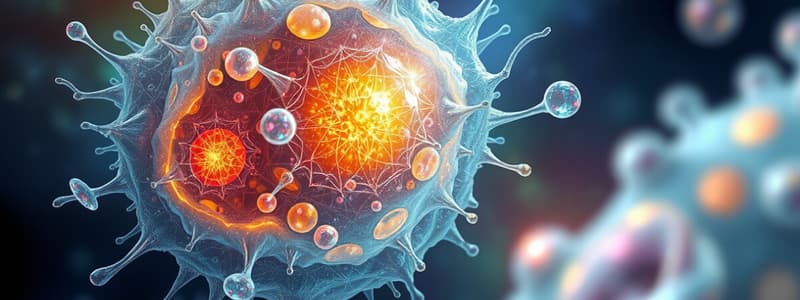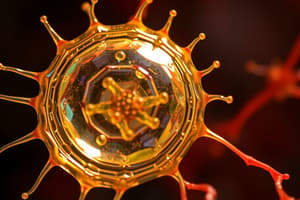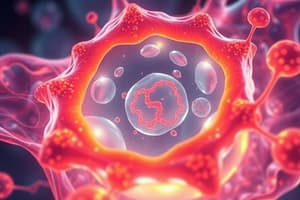Podcast
Questions and Answers
What does the principle that all living organisms are composed of one or more cells establish?
What does the principle that all living organisms are composed of one or more cells establish?
- Cells are the basic unit of life in all living organisms. (correct)
- Cells are only found in multicellular organisms.
- Cells are larger than organisms.
- Cells can perform functions independently of the organism.
Which scientist is credited with coining the term 'cell' after observing cork cells?
Which scientist is credited with coining the term 'cell' after observing cork cells?
- Rudolf Virchow
- Anton van Leeuwenhoek
- Matthias Schleiden
- Robert Hooke (correct)
What did the principle that cells arise from pre-existing cells disprove?
What did the principle that cells arise from pre-existing cells disprove?
- The structure of the cell.
- The classification of organisms.
- The cell theory itself.
- The concept of spontaneous generation. (correct)
Which statement is true based on cell theory?
Which statement is true based on cell theory?
Who was the first to observe and describe single-celled organisms?
Who was the first to observe and describe single-celled organisms?
What term is used to describe the fact that cells are the smallest units of life capable of performing all life processes?
What term is used to describe the fact that cells are the smallest units of life capable of performing all life processes?
Which of the following scientists proposed that all living things are made of cells?
Which of the following scientists proposed that all living things are made of cells?
What similarity do all cells share in terms of their composition?
What similarity do all cells share in terms of their composition?
Flashcards are hidden until you start studying
Study Notes
Overview of Cell Theory
- Coined by Robert Hooke, the term "cell" derives from the resemblance of cells to monk's living quarters, known as cells.
- Cell theory is a cornerstone of biology outlining the properties and functions of cells.
- Development of cell theory involved contributions from multiple scientists over time.
Key Principles of Cell Theory
- All living organisms consist of one or more cells, establishing that cells are the fundamental unit of life.
- Cells serve as the basic organizational structure in organisms, being the smallest units capable of performing life functions.
- Cells originate from pre-existing cells, a principle known as biogenesis, which refutes the notion of spontaneous generation.
Pioneering Scientists and Contributions
- Robert Hooke (1665): First observed cork cells using a microscope, leading to the introduction of the term "cell."
- Anton van Leeuwenhoek (1674): First to observe and describe single-celled organisms, including bacteria and protozoa.
- Matthias Schleiden (1838): Proposed that all plants are made up of cells.
- Theodor Schwann (1839): Suggested that all living things are composed of cells.
- Rudolf Virchow (1855): Asserted that all cells come from pre-existing cells, encapsulated in the phrase “Omnis cellula e cellula.”
Additional Insights on Cells
- Cells contain DNA, which carries hereditary information and is transferred during cell division.
- The chemical composition of all cells is fundamentally the same.
- Energy flow through metabolism and biochemical reactions occurs within cells.
Relevance of Cell Theory Today
- Cell theory is integral in understanding body growth, healing processes, and the development of medical treatments.
- Principles established by early scientists remain central to modern science and medical research, highlighting their enduring impact.
Studying That Suits You
Use AI to generate personalized quizzes and flashcards to suit your learning preferences.




